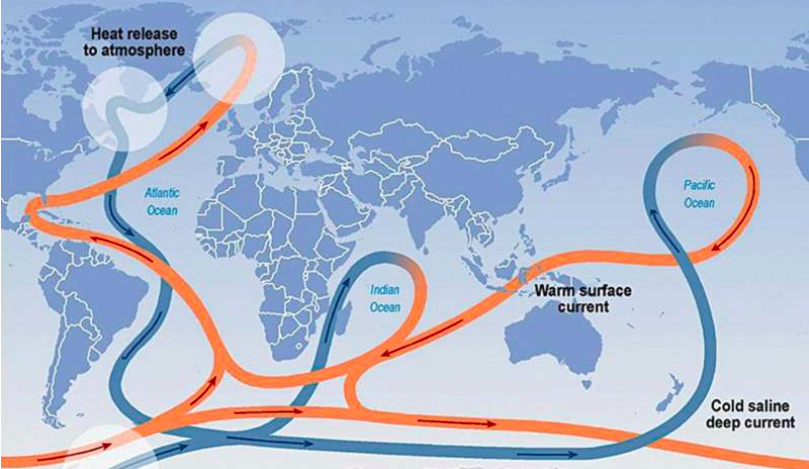A Possible Tipping Point for Ireland
Changes to ocean circulations and colder weather ahead?
Tipping points can be tricky. Literally, they represent critical points or moments “in a situation, process, or system beyond which a significant and often unstoppable effect or change takes place.” Merriam-Webster. The concept of a tipping point arises in analyses of conditions that potentially will affect climate breakdown.
From global climate studies generally, “we know that the earth has been slowly, gradually warming over a hundred years and more, but there are or may be turning points when greenhouse gases have built up so that the earth’s warming will have irreversible and drastic adverse effects. Such irreversible effects include the melting of the North Pole’s sea ice, Greenland’s glaciers and the Antarctic ice sheets…”. See “Tipping Point” in iePEDIA section of www.irishenvironment (1 April 2013), at bit.ly/3BM7TB4
Tipping points can be tricky because they undermine the notion of a clear, direct and slow linear change in the climate by showing that under certain circumstances changes can be sudden and abrupt and lead to irreversible changes. We can prepare better for the slow linear changes a lot better than for the sudden and abrupt and possibly irreversible changes.
One condition that may be experiencing a tipping point is ocean circulations. The weather in Ireland is affected in significant ways by the circulation of waters in the Atlantic Ocean, referred to as the Atlantic Meridional Overturning Circulator (AMOC), also sometimes referred to as the Atlantic Thermohaline Circulation (THC). The UK Met Office describes the AMOC as:
… a large system of ocean currents, like a conveyor belt, driven by differences in temperature and salt content – the water’s density. As warm water flows northwards it cools and some evaporation occurs, which increases the amount of salt. Low temperature and a high salt content make the water denser, and this dense water sinks deep into the ocean. The cold, dense water slowly spreads southwards, several kilometres below the surface. Eventually, it gets pulled back to the surface and warms in a process called “upwelling” and the circulation is complete.

That system accounts for the warm weather experienced in Ireland despite the fact that it is on the same latitude as Siberia. If the AMOC weakens or is blocked, the climate in Ireland could turn much colder, not unlike the climate in Siberia. If that happens then the Irish would need more than a few traditional Aran sweaters. Moreover, the weakening of the AMOC could adversely, and significantly, affect monsoons and rain throughout India, South America and West Africa.
Is such a condition possible? Likely?
In the Fourth Assessment of the IPCC on climate change in 2007 it is pointed out that, “The IPCC argues that an abrupt transition of the THC [now described as the AMOC], is “very unlikely” (probability <10%) to occur before 2100 and that any transition is likely to take a century or more.” See Lenton et al, below.
But in the unfolding Sixth Assessment by IPCC (August 2021) it is reported that the AMOC has been weakening, with an almost total loss of stability over the previous century. It is estimated that the tipping point for AMOC becomes possible with a 1.5°C rise in global temperatures and that the tipping point may be only 50 years away or sooner.
While the exact moment for any AMOC tipping point remains uncertain, “there is an urgent need to act in order to reduce our GHG production. It is also becoming clearer by the day that there is a real need to encourage preparedness and resilience building across countries that would be the most heavily impacted by such an event.” See Emmanuel Rivera, below.
Certainly Ireland needs an assessment of the balance of the rising temperatures from global warming and the cooling from any weakening or collapse of the AMOC in order to develop a resilient future.
Sources:
“Tipping point.” Merriam-Webster.com Dictionary, Merriam-Webster, www.merriam-webster.com/dictionary/tipping%20point. Accessed 22 Sep. 2022
“What is the Atlantic Meridional Overturning Circulation?” UK Met Office bit.ly/3dTfg1O
Timothy M. Lenton et al., “Tipping elements in the Earth’s climate system,” Proceedings of the National Academy of Sciences (PNAS) (12 February 2008). https://doi.org/10.1073/pnas.0705414105
David I. Armstrong McKay, et al., “Exceeding 1.5°C global warming could trigger multiple climate tipping points,” Climate Tipping Points (Sept 2022). bit.ly/3BPJ9YJ
Damian Carrington, “World on brink of five ‘disastrous’ climate tipping points, study finds,” The Guardian (8 Sept 2022). bit.ly/3quthph
Extreme Weather Events Are All the Rage: A European/ Norwegian Study in Reports section of www.irishenvironment.com (1 May 2018).
Sam Starkey, “An ocean current keeps Ireland warm. What could happen if it collapses,” Green News (11 August 2021). greennews.ie/amoc-explainer-2021/
Emmanuel Rivera, “Climate change tipping points: a look at the case of the AMOC,” Pilot4DEV (9 August 2022). https://bit.ly/3y1UZOd
See “What Will Earth Look Like When These 6 Tipping Points Hit?” in Podcast section of new October issue of www.irishenvironment.com


No comments yet, add your own below